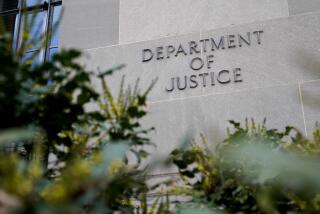Court Applies Tougher Test to Jury Awards
- Share via
WASHINGTON — The Supreme Court gave American corporations an important legal victory in their fight against large punitive verdicts Monday, ruling that appellate judges should skeptically review these big-money awards.
The decision not only gives company lawyers an extra chance to knock down a punishing verdict, but it virtually invites judges to second-guess a jury’s decision.
The ruling is the latest to show the high court’s concern about what appears to be exorbitant jury awards of punitive damages.
These damages are intended to punish the wrongdoer, not compensate the victim. On occasion, an angry jury hands down a huge punitive verdict in a case in which the victim suffered relatively little.
In the case decided Monday, a $50,000 dispute over the design of a pocketknife led to a $4.5-million punitive verdict against Cooper Industries Inc., a Houston-based toolmaking firm.
Sometimes an element of hometown justice appears to be at work.
Leatherman Toolmaking Group Inc., based in Portland, Ore., had made and marketed a highly successful pocket tool that improved on the classic Swiss army knife.
In 1995, the Texas firm decided to market its own pocket tool and at a national hardware show in Chicago, it displayed a product that essentially copied Leatherman’s tool.
The original maker sued for trademark violations and false advertising, even though Cooper later marketed a modified pocket tool.
But the Portland jury sided with Leatherman and awarded the local firm the $4.5 million in punitive damages to punish its Texas rival.
In the last decade, the Supreme Court has seen a series of cases in which lawyers in Alabama or Mississippi urged juries to “send a message” to a big corporation in New York, Chicago or Los Angeles. Five years ago, the high court ruled for the first time that such damages are unconstitutional if they are grossly excessive to the underlying offense.
It came in the case of the scratched BMW. An Alabama doctor had sued when his local mechanic pointed out that his new German car had a scratch that had been painted over after it arrived in the United States.
The jury in Birmingham, Ala., agreed on the auto maker’s liability for this shipping damage and awarded him $4,000 in compensatory damages. Then, to punish the German firm for its deception, the jury awarded the doctor $4 million in punitive damages.
The high court’s opinion in that case, BMV vs. Gore, reversed the award and set out the factors that would make a punitive verdict suspect.
But until Monday, it remained unclear whether appellate judges should closely review a punitive award after a trial judge upheld it.
On a 8-1 vote, the justices overturned the $4.5-million punitive award in the pocketknife case and told the appeals courts to give such verdicts more aggressive scrutiny.
A Chicago lawyer who defends corporations in such cases called the ruling a major victory. “The Supreme Court is showing its frustration with these runaway punitive damages,” said Lori Nugent. “This will make a difference because it puts pressure on the appeals courts to independently assess these verdicts.”
The U.S. 9th Circuit Court of Appeals, based in San Francisco, had upheld the jury verdict in the pocketknife case in a brief opinion. Its judges had taken the view that they should not second-guess such verdicts unless the trial judge had bungled badly.
Monday’s ruling in Cooper Industries vs. Leatherman Tool Group reversed the 9th Circuit and told its judges to reconsider the verdict.
For more than a decade, corporate lawyers and lobbyists in Washington have been urging Congress to rein in large jury verdicts.
Business officials say they particularly fear punitive damages because they are so unpredictable. For example, insurance companies that have been accused of failing to pay a $5,000 claim have been hit with punitive verdicts of $1.5 million.
To head off such punishing verdicts, corporate lawyers say they are forced to offer large settlements in advance of trials.
Despite these complaints, the campaign for “tort reform” has made little headway in Congress. Consumer groups and trial lawyers have rallied to stop most legislation.
But the same fight has been played out in the Supreme Court, where business lawyers have put some brakes on jury awards.
Speaking for the court, Justice John Paul Stevens described punitive verdicts as akin to a “private fine” that expresses “moral condemnation.”
Jurors normally are entrusted with deciding facts, such as whether the accused person committed the offense, the justice said. But these individuals have no special expertise in deciding how much money will condemn a wrongdoer.
Such punishment decisions usually are made by judges, he said. Therefore, U.S. courts of appeals should give these verdicts fresh reviews.
Only Justice Ruth Bader Ginsburg dissented, arguing that judges should not be encouraged to second-guess juries’ verdicts.
More to Read
Inside the business of entertainment
The Wide Shot brings you news, analysis and insights on everything from streaming wars to production — and what it all means for the future.
You may occasionally receive promotional content from the Los Angeles Times.











